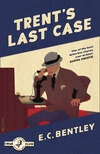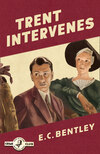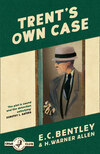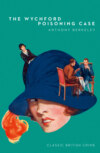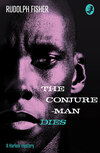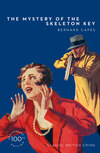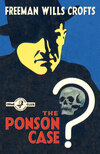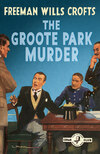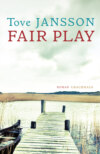Kitabı oku: «Trent’s Last Case», sayfa 3
‘Did she love him?’ Trent enquired abruptly. Mr Cupples did not reply at once. ‘Had she any love left for him?’ Trent amended.
Mr Cupples played with his teaspoon. ‘I am bound to say,’ he answered slowly, ‘that I think not. But you must not misunderstand the woman, Trent. No power on earth would have persuaded her to admit that to anyone—even to herself, perhaps—so long as she considered herself bound to him. And I gather that, apart from this mysterious sulking of late, he had always been considerate and generous.’
‘You were saying that she refused to have it out with him.’
‘She did,’ replied Mr Cupples. ‘And I knew by experience that it was quite useless to attempt to move a Domecq where the sense of dignity was involved. So I thought it over carefully, and next day I watched my opportunity and met Manderson as he passed by this hotel. I asked him to favour me with a few minutes’ conversation, and he stepped inside the gate down there. We had held no communication of any kind since my niece’s marriage, but he remembered me, of course. I put the matter to him at once and quite definitely. I told him what Mabel had confided to me. I said that I would neither approve nor condemn her action in bringing me into the business, but that she was suffering, and I considered it my right to ask how he could justify himself in placing her in such a position.’
‘And how did he take that?’ said Trent, smiling secretly at the landscape. The picture of this mildest of men calling the formidable Manderson to account pleased him.
‘Not very well,’ Mr Cupples replied sadly. ‘In fact, far from well. I can tell you almost exactly what he said—it wasn’t much. He said, “See here, Cupples, you don’t want to butt in. My wife can look after herself. I’ve found that out, along with other things.” He was perfectly quiet—you know he was said never to lose control of himself—though there was a light in his eyes that would have frightened a man who was in the wrong, I dare say. But I had been thoroughly roused by his last remark, and the tone of it, which I cannot reproduce. You see,’ said Mr Cupples simply, ‘I love my niece. She is the only child that there has been in our—in my house. Moreover, my wife brought her up as a girl, and any reflection on Mabel I could not help feeling, in the heat of the moment, as an indirect reflection upon one who is gone.’
‘You turned upon him,’ suggested Trent in a low tone. ‘You asked him to explain his words.’
‘That is precisely what I did,’ said Mr Cupples. ‘For a moment he only stared at me, and I could see a vein on his forehead swelling—an unpleasant sight. Then he said quite quietly, “This thing has gone far enough, I guess,” and turned to go.’
‘Did he mean your interview?’ Trent asked thoughtfully.
‘From the words alone you would think so,’ Mr Cupples answered. ‘But the way in which he uttered them gave me a strange and very apprehensive feeling. I received the impression that the man had formed some sinister resolve. But I regret to say I had lost the power of dispassionate thought. I fell into a great rage’—Mr Cupples’s tone was mildly apologetic—‘and said a number of foolish things. I reminded him that the law allowed a measure of freedom to wives who received intolerable treatment. I made some utterly irrelevant references to his public record, and expressed the view that such men as he were unfit to live. I said these things, and others as ill-considered, under the eyes, and very possibly within earshot, of half a dozen persons sitting on this veranda. I noticed them, in spite of my agitation, looking at me as I walked up to the hotel again after relieving my mind for it undoubtedly did relieve it,’ sighed Mr Cupples, lying back in his chair.
‘And Manderson? Did he say no more?’
‘Not a word. He listened to me with his eyes on my face, as quiet as before. When I stopped he smiled very slightly, and at once turned away and strolled through the gate, making for White Gables.’
‘And this happened—?’
‘On the Sunday morning.’
‘Then I suppose you never saw him alive again?’
‘No,’ said Mr Cupples. ‘Or rather yes—once. It was later in the day, on the golf-course. But I did not speak to him. And next morning he was found dead.’
The two regarded each other in silence for a few moments. A party of guests who had been bathing came up the steps and seated themselves, with much chattering, at a table near them. The waiter approached. Mr Cupples rose, and, taking Trent’s arm, led him to a long tennis-lawn at the side of the hotel.
‘I have a reason for telling you all this,’ began Mr Cupples as they paced slowly up and down.
‘Trust you for that,’ rejoined Trent, carefully filling his pipe again. He lit it, smoked a little, and then said, ‘I’ll try and guess what your reason is, if you like.’
Mr Cupples’s face of solemnity relaxed into a slight smile. He said nothing.
‘You thought it possible,’ said Trent meditatively ‘—may I say you thought it practically certain?—that I should find out for myself that there had been something deeper than a mere conjugal tiff between the Mandersons. You thought that my unwholesome imagination would begin at once to play with the idea of Mrs Manderson having something to do with the crime. Rather than that I should lose myself in barren speculations about this, you decided to tell me exactly how matters stood, and incidentally to impress upon me, who know how excellent your judgement is, your opinion of your niece. Is that about right?’
‘It is perfectly right. Listen to me, my dear fellow,’ said Mr Cupples earnestly, laying his hand on the other’s arm. ‘I am going to be very frank. I am extremely glad that Manderson is dead. I believe him to have done nothing but harm in the world as an economic factor. I know that he was making a desert of the life of one who was like my own child to me. But I am under an intolerable dread of Mabel being involved in suspicion with regard to the murder. It is horrible to me to think of her delicacy and goodness being in contact, if only for a time, with the brutalities of the law. She is not fitted for it. It would mark her deeply. Many young women of twenty-six in these days could face such an ordeal, I suppose. I have observed a sort of imitative hardness about the products of the higher education of women today which would carry them through anything, perhaps.
‘I am not prepared to say it is a bad thing in the conditions of feminine life prevailing at present. Mabel, however, is not like that. She is as unlike that as she is unlike the simpering misses that used to surround me as a child. She has plenty of brains; she is full of character; her mind and her tastes are cultivated; but it is all mixed up’—Mr Cupples waved his hands in a vague gesture—‘with ideals of refinement and reservation and womanly mystery. I fear she is not a child of the age. You never knew my wife, Trent. Mabel is my wife’s child.’
The younger man bowed his head. They paced the length of the lawn before he asked gently, ‘Why did she marry him?’
‘I don’t know,’ said Mr Cupples briefly.
‘Admired him, I suppose,’ suggested Trent.
Mr Cupples shrugged his shoulders. ‘I have been told that a woman will usually be more or less attracted by the most successful man in her circle. Of course we cannot realise how a wilful, dominating personality like his would influence a girl whose affections were not bestowed elsewhere; especially if he laid himself out to win her. It is probably an overwhelming thing to be courted by a man whose name is known all over the world. She had heard of him, of course, as a financial great power, and she had no idea—she had lived mostly among people of artistic or literary propensities—how much soulless inhumanity that might involve. For all I know, she has no adequate idea of it to this day. When I first heard of the affair the mischief was done, and I knew better than to interpose my unsought opinions. She was of age, and there was absolutely nothing against him from the conventional point of view. Then I dare say his immense wealth would cast a spell over almost any woman. Mabel had some hundreds a year of her own; just enough, perhaps, to let her realise what millions really meant. But all this is conjecture. She certainly had not wanted to marry some scores of young fellows who to my knowledge had asked her; and though I don’t believe, and never did believe, that she really loved this man of forty-five, she certainly did want to marry him. But if you ask me why, I can only say I don’t know.’
Trent nodded, and after a few more paces looked at his watch. ‘You’ve interested me so much,’ he said, ‘that I had quite forgotten my main business. I mustn’t waste my morning. I am going down the road to White Gables at once, and I dare say I shall be poking about there until midday. If you can meet me then, Cupples, I should like to talk over anything I find out with you, unless something detains me.’
‘I am going for a walk this morning,’ Mr Cupples replied. ‘I meant to have luncheon at a little inn near the golf-course, The Three Tuns. You had better join me there. It’s further along the road, about a quarter of a mile beyond White Gables. You can just see the roof between those two trees. The food they give one there is very plain, but good.’
‘So long as they have a cask of beer,’ said Trent, ‘they are all right. We will have bread and cheese, and oh, may Heaven our simple lives prevent from luxury’s contagion, weak and vile! Till then, goodbye.’ He strode off to recover his hat from the veranda, waved it to Mr Cupples, and was gone.
The old gentleman, seating himself in a deck-chair on the lawn, clasped his hands behind his head and gazed up into the speckless blue sky. ‘He is a dear fellow,’ he murmured. ‘The best of fellows. And a terribly acute fellow. Dear me! How curious it all is!’
CHAPTER IV
HANDCUFFS IN THE AIR
A PAINTER and the son of a painter, Philip Trent had while yet in his twenties achieved some reputation within the world of English art. Moreover, his pictures sold. An original, forcible talent and a habit of leisurely but continuous working, broken by fits of strong creative enthusiasm, were at the bottom of it. His father’s name had helped; a patrimony large enough to relieve him of the perilous imputation of being a struggling man had certainly not hindered. But his best aid to success had been an unconscious power of getting himself liked. Good spirits and a lively, humorous fancy will always be popular. Trent joined to these a genuine interest in others that gained him something deeper than popularity. His judgement of persons was penetrating, but its process was internal; no one felt on good behaviour with a man who seemed always to be enjoying himself. Whether he was in a mood for floods of nonsense or applying himself vigorously to a task, his face seldom lost its expression of contained vivacity. Apart from a sound knowledge of his art and its history, his culture was large and loose, dominated by a love of poetry. At thirty-two he had not yet passed the age of laughter and adventure.
His rise to a celebrity a hundred times greater than his proper work had won for him came of a momentary impulse. One day he had taken up a newspaper to find it chiefly concerned with a crime of a sort curiously rare in our country—a murder done in a railway train. The circumstances were puzzling; two persons were under arrest upon suspicion. Trent, to whom an interest in such affairs was a new sensation, heard the thing discussed among his friends, and set himself in a purposeless mood to read up the accounts given in several journals. He became intrigued; his imagination began to work, in a manner strange to him, upon facts; an excitement took hold of him such as he had only known before in his bursts of art-inspiration or of personal adventure. At the end of the day he wrote and dispatched a long letter to the editor of the Record, which he chose only because it had contained the fullest and most intelligent version of the facts.
In this letter he did very much what Poe had done in the case of the murder of Mary Rogers. With nothing but the newspapers to guide him, he drew attention to the significance of certain apparently negligible facts, and ranged the evidence in such a manner as to throw grave suspicion upon a man who had presented himself as a witness. Sir James Molloy had printed this letter in leaded type. The same evening he was able to announce in the Sun the arrest and full confession of the incriminated man.
Sir James, who knew all the worlds of London, had lost no time in making Trent’s acquaintance. The two men got on well, for Trent possessed some secret of native tact which had the effect of almost abolishing differences of age between himself and others. The great rotary presses in the basement of the Record building had filled him with a new enthusiasm. He had painted there, and Sir James had bought at sight, what he called a machinery-scape in the manner of Heinrich Kley.
Then a few months later came the affair known as the Ilkley mystery. Sir James had invited Trent to an emollient dinner, and thereafter offered him what seemed to the young man a fantastically large sum for his temporary services as special representative of the Record at Ilkley.
‘You could do it,’ the editor had urged. ‘You can write good stuff, and you know how to talk to people, and I can teach you all the technicalities of a reporter’s job in half an hour. And you have a head for a mystery; you have imagination and cool judgement along with it. Think how it would feel if you pulled it off!’
Trent had admitted that it would be rather a lark. He had smoked, frowned, and at last convinced himself that the only thing that held him back was fear of an unfamiliar task. To react against fear had become a fixed moral habit with him, and he had accepted Sir James’s offer.
He had pulled it off. For the second time he had given the authorities a start and a beating, and his name was on all tongues. He withdrew and painted pictures. He felt no leaning towards journalism, and Sir James, who knew a good deal about art, honourably refrained—as other editors did not—from tempting him with a good salary. But in the course of a few years he had applied to him perhaps thirty times for his services in the unravelling of similar problems at home and abroad. Sometimes Trent, busy with work that held him, had refused; sometimes he had been forestalled in the discovery of the truth. But the result of his irregular connection with the Record had been to make his name one of the best known in England. It was characteristic of him that his name was almost the only detail of his personality known to the public. He had imposed absolute silence about himself upon the Molloy papers; and the others were not going to advertise one of Sir James’s men.
The Manderson case, he told himself as he walked rapidly up the sloping road to White Gables, might turn out to be terribly simple. Cupples was a wise old boy, but it was probably impossible for him to have an impartial opinion about his niece. But it was true that the manager of the hotel, who had spoken of her beauty in terms that aroused his attention, had spoken even more emphatically of her goodness. Not an artist in words, the manager had yet conveyed a very definite idea to Trent’s mind. ‘There isn’t a child about here that don’t brighten up at the sound of her voice,’ he had said, ‘nor yet a grown-up, for the matter of that. Everybody used to look forward to her coming over in the summer. I don’t mean that she’s one of those women that are all kind heart and nothing else. There’s backbone with it, if you know what I mean—pluck—any amount of go. There’s nobody in Marlstone that isn’t sorry for the lady in her trouble—not but what some of us may think she’s lucky at the last of it.’ Trent wanted very much to meet Mrs Manderson.
He could see now, beyond a spacious lawn and shrubbery, the front of the two-storied house of dull-red brick, with the pair of great gables from which it had its name. He had had but a glimpse of it from the car that morning. A modern house, he saw; perhaps ten years old. The place was beautifully kept, with that air of opulent peace that clothes even the smallest houses of the well-to-do in an English countryside. Before it, beyond the road, the rich meadow-land ran down to the edge of the cliffs; behind it a woody landscape stretched away across a broad vale to the moors. That such a place could be the scene of a crime of violence seemed fantastic; it lay so quiet and well ordered, so eloquent of disciplined service and gentle living. Yet there beyond the house, and near the hedge that rose between the garden and the hot, white road, stood the gardener’s toolshed, by which the body had been found, lying tumbled against the wooden wall.
Trent walked past the gate of the drive and along the road until he was opposite this shed. Some forty yards further along the road turned sharply away from the house, to run between thick plantations; and just before the turn the grounds of the house ended, with a small white gate at the angle of the boundary hedge. He approached the gate, which was plainly for the use of gardeners and the service of the establishment. It swung easily on its hinges, and he passed slowly up a path that led towards the back of the house, between the outer hedge and a tall wall of rhododendrons. Through a gap in this wall a track led him to the little neatly built erection of wood, which stood among trees that faced a corner of the front. The body had lain on the side away from the house; a servant, he thought, looking out of the nearer windows in the earlier hours of the day before, might have glanced unseeing at the hut, as she wondered what it could be like to be as rich as the master.
He examined the place carefully and ransacked the hut within, but he could note no more than the trodden appearance of the uncut grass where the body had lain. Crouching low, with keen eyes and feeling fingers, he searched the ground minutely over a wide area; but the search was fruitless.
It was interrupted by the sound—the first he had heard from the house—of the closing of the front door. Trent unbent his long legs and stepped to the edge of the drive. A man was walking quickly away from the house in the direction of the great gate.
At the noise of a footstep on the gravel, the man wheeled with nervous swiftness and looked earnestly at Trent. The sudden sight of his face was almost terrible, so white and worn it was. Yet it was a young man’s face. There was not a wrinkle about the haggard blue eyes, for all their tale of strain and desperate fatigue. As the two approached each other, Trent noted with admiration the man’s breadth of shoulder and lithe, strong figure. In his carriage, inelastic as weariness had made it; in his handsome, regular features; in his short, smooth, yellow hair; and in his voice as he addressed Trent, the influence of a special sort of training was confessed. ‘Oxford was your playground, I think, my young friend,’ said Trent to himself.
‘If you are Mr Trent,’ said the young man pleasantly, ‘you are expected. Mr Cupples telephoned from the hotel. My name is Marlowe.’
‘You were secretary to Mr Manderson, I believe,’ said Trent. He was much inclined to like young Mr Marlowe. Though he seemed so near a physical breakdown, he gave out none the less that air of clean living and inward health that is the peculiar glory of his social type at his years. But there was something in the tired eyes that was a challenge to Trent’s penetration; an habitual expression, as he took it to be, of meditating and weighing things not present to their sight. It was a look too intelligent, too steady and purposeful, to be called dreamy. Trent thought he had seen such a look before somewhere. He went on to say: ‘It is a terrible business for all of you. I fear it has upset you completely, Mr Marlowe.’
‘A little limp, that’s all,’ replied the young man wearily. ‘I was driving the car all Sunday night and most of yesterday, and I didn’t sleep last night after hearing the news—who would? But I have an appointment now, Mr Trent, down at the doctor’s—arranging about the inquest. I expect it’ll be tomorrow. If you will go up to the house and ask for Mr Bunner, you’ll find him expecting you; he will tell you all about things and show you round. He’s the other secretary; an American, and the best of fellows; he’ll look after you. There’s a detective here, by the way—Inspector Murch, from Scotland Yard. He came yesterday.’
‘Murch!’ Trent exclaimed. ‘But he and I are old friends. How under the sun did he get here so soon?’
‘I have no idea,’ Mr Marlowe answered. ‘But he was here last evening, before I got back from Southampton, interviewing everybody, and he’s been about here since eight this morning. He’s in the library now—that’s where the open French window is that you see at the end of the house there. Perhaps you would like to step down there and talk about things.’
‘I think I will,’ said Trent. Marlowe nodded and went on his way. The thick turf of the lawn round which the drive took its circular sweep made Trent’s footsteps as noiseless as a cat’s. In a few moments he was looking in through the open leaves of the window at the southward end of the house, considering with a smile a very broad back and a bent head covered with short grizzled hair. The man within was stooping over a number of papers laid out on the table.
‘’Twas ever thus,’ said Trent in a melancholy tone, at the first sound of which the man within turned round with startling swiftness. ‘From childhood’s hour I’ve seen my fondest hopes decay. I did think I was ahead of Scotland Yard this time, and now here is the hugest officer in the entire Metropolitan force already occupying the position.’
The detective smiled grimly and came to the window. ‘I was expecting you, Mr Trent,’ he said. ‘This is the sort of case that you like.’
‘Since my tastes were being considered,’ Trent replied, stepping into the room, ‘I wish they had followed up the idea by keeping my hated rival out of the business. You have got a long start, too—I know all about it.’ His eyes began to wander round the room. ‘How did you manage it? You are a quick mover, I know; the dun deer’s hide on fleeter foot was never tied; but I don’t see how you got here in time to be at work yesterday evening. Has Scotland Yard secretly started an aviation corps? Or is it in league with the infernal powers? In either case the Home Secretary should be called upon to make a statement.’
‘It’s simpler than that,’ said Mr Murch with professional stolidity. ‘I happened to be on leave with the missus at Halvey, which is only twelve miles or so along the coast. As soon as our people there heard of the murder they told me. I wired to the Chief, and was put in charge of the case at once. I bicycled over yesterday evening, and have been at it since then.’
‘Arising out of that reply,’ said Trent inattentively, ‘how is Mrs Inspector Murch?’
‘Never better, thank you,’ answered the inspector, ‘and frequently speaks of you and the games you used to have with our kids. But you’ll excuse me saying, Mr Trent, that you needn’t trouble to talk your nonsense to me while you’re using your eyes. I know your ways by now. I understand you’ve fallen on your feet as usual, and have the lady’s permission to go over the place and make inquiries.’
‘Such is the fact,’ said Trent. ‘I am going to cut you out again, inspector. I owe you one for beating me over the Abinger case, you old fox. But if you really mean that you’re not inclined for the social amenities just now, let us leave compliments and talk business.’ He stepped to the table, glanced through the papers arranged there in order, and then turned to the open roll-top desk. He looked into the drawers swiftly. ‘I see this has been cleared out. Well now, inspector, I suppose we play the game as before.’
Trent had found himself on a number of occasions in the past thrown into the company of Inspector Murch, who stood high in the councils of the Criminal Investigation Department. He was a quiet, tactful, and very shrewd officer, a man of great courage, with a vivid history in connection with the more dangerous class of criminals. His humanity was as broad as his frame, which was large even for a policeman. Trent and he, through some obscure working of sympathy, had appreciated one another from the beginning, and had formed one of those curious friendships with which it was the younger man’s delight to adorn his experience. The inspector would talk more freely to him than to anyone, under the rose, and they would discuss details and possibilities of every case, to their mutual enlightenment. There were necessarily rules and limits. It was understood between them that Trent made no journalistic use of any point that could only have come to him from an official source. Each of them, moreover, for the honour and prestige of the institution he represented, openly reserved the right to withhold from the other any discovery or inspiration that might come to him which he considered vital to the solution of the difficulty. Trent had insisted on carefully formulating these principles of what he called detective sportsmanship. Mr Murch, who loved a contest, and who only stood to gain by his association with the keen intelligence of the other, entered very heartily into ‘the game’. In these strivings for the credit of the press and of the police, victory sometimes attended the experience and method of the officer, sometimes the quicker brain and livelier imagination of Trent, his gift of instinctively recognising the significant through all disguises.
The inspector then replied to Trent’s last words with cordial agreement. Leaning on either side of the French window, with the deep peace and hazy splendour of the summer landscape before them, they reviewed the case.
Trent had taken out a thin notebook, and as they talked he began to make, with light, secure touches, a rough sketch plan of the room. It was a thing he did habitually on such occasions, and often quite idly, but now and then the habit had served him to good purpose.
This was a large, light apartment at the corner of the house, with generous window-space in two walls. A broad table stood in the middle. As one entered by the window the roll-top desk stood just to the left of it against the wall. The inner door was in the wall to the left, at the farther end of the room; and was faced by a broad window divided into openings of the casement type. A beautifully carved old corner-cupboard rose high against the wall beyond the door, and another cupboard filled a recess beside the fireplace. Some coloured prints of Harunobu, with which Trent promised himself a better acquaintance, hung on what little wall-space was unoccupied by books. These had a very uninspiring appearance of having been bought by the yard and never taken from their shelves. Bound with a sober luxury, the great English novelists, essayists, historians, and poets stood ranged like an army struck dead in its ranks. There were a few chairs made, like the cupboard and table, of old carved oak; a modern armchair and a swivel office-chair before the desk. The room looked costly but very bare. Almost the only portable objects were a great porcelain bowl of a wonderful blue on the table, a clock and some cigar boxes on the mantelshelf, and a movable telephone standard on the top of the desk.
‘Seen the body?’ inquired the inspector.
Trent nodded. ‘And the place where it lay,’ he said.
‘First impressions of this case rather puzzle me,’ said the inspector. ‘From what I heard at Halvey I guessed it might be common robbery and murder by some tramp, though such a thing is very far from common in these parts. But as soon as I began my inquiries I came on some curious points, which by this time I dare say you’ve noted for yourself. The man is shot in his own grounds, quite near the house, to begin with. Yet there’s not the slightest trace of any attempt at burglary. And the body wasn’t robbed. In fact, it would be as plain a case of suicide as you could wish to see, if it wasn’t for certain facts. Here’s another thing: for a month or so past, they tell me, Manderson had been in a queer state of mind. I expect you know already that he and his wife had some trouble between them. The servants had noticed a change in his manner to her for a long time, and for the past week he had scarcely spoken to her. They say he was a changed man, moody and silent—whether on account of that or something else. The lady’s maid says he looked as if something was going to arrive. It’s always easy to remember that people looked like that, after something has happened to them. Still, that’s what they say. There you are again, then: suicide! Now, why wasn’t it suicide, Mr Trent?’
‘The facts so far as I know them are really all against it,’ Trent replied, sitting on the threshold of the window and clasping his knees. ‘First, of course, no weapon is to be found. I’ve searched, and you’ve searched, and there’s no trace of any firearm anywhere within a stone’s throw of where the body lay. Second, the marks on the wrists, fresh scratches and bruises, which we can only assume to have been done in a struggle with somebody. Third, who ever heard of anybody shooting himself in the eye? Then I heard from the manager of the hotel here another fact, which strikes me as the most curious detail in this affair. Manderson had dressed himself fully before going out there, but he forgot his false teeth. Now how could a suicide who dressed himself to make a decent appearance as a corpse forget his teeth?’
Ücretsiz ön izlemeyi tamamladınız.
